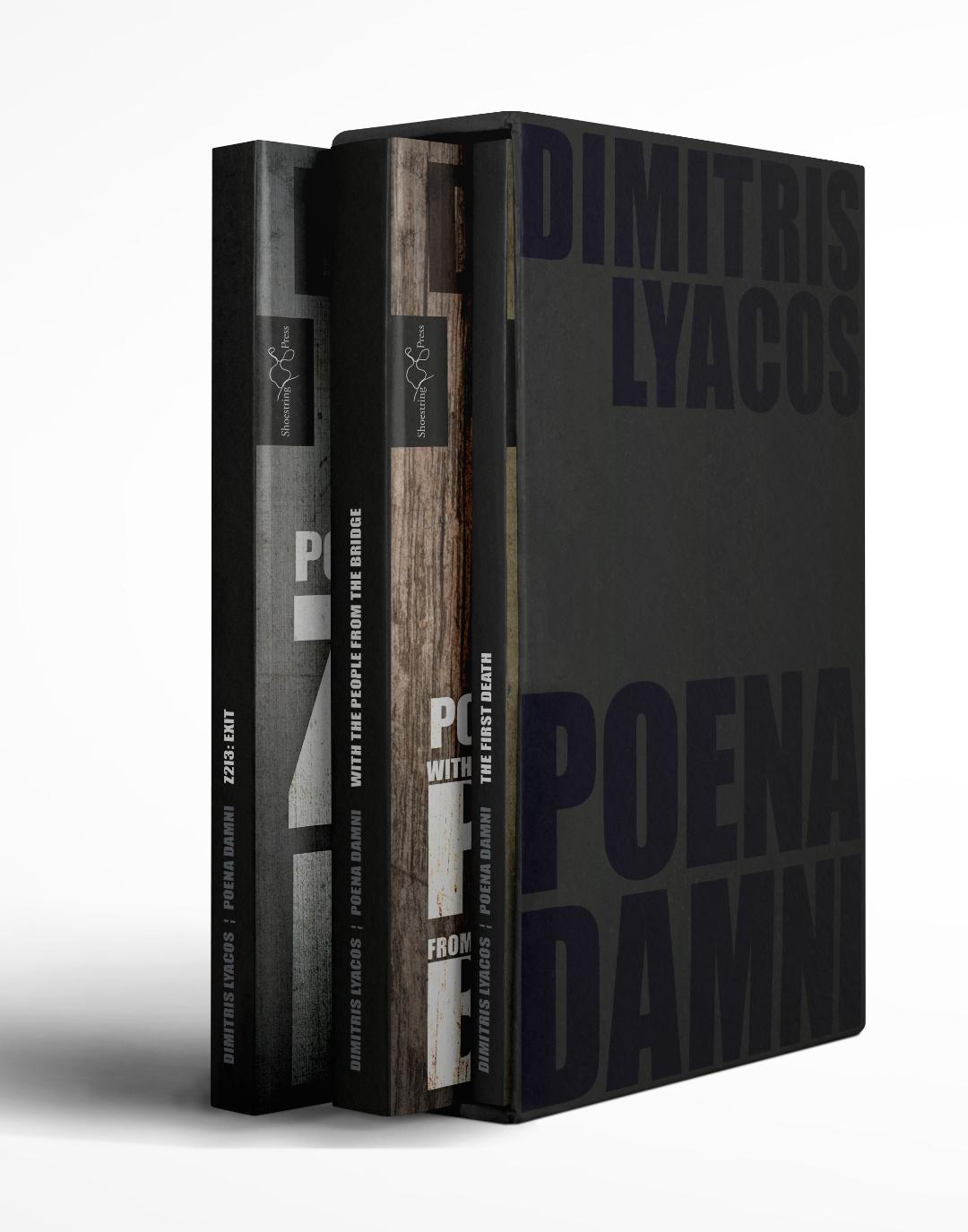Book Review: Poena Damni Trilogy by Dimitris Lyacos (Translated by Shorsha Sullivan)

The tricky thing about translating poetry is that poems often rely on the singular meaning of a word. Often a single word will stand alone, though perhaps accompanied by fragments of a sentence, and it is the task of the translator to imbue the meaning of that word or fragment into different words in the target language. This is not a new problem, but it is nevertheless a problem that I think Shorsha Sullivan handles masterfully in the translation of the Z213: Exit, the first book in the Poena Damni trilogy. The poetry of these books flows between what seem at first glance to be insurmountable walls of text to pages with words and fragments scattered across them, the thoughts of the speaker wandering from page to page in a way that comes across as both meandering and frantic as the text is composed of a kind of poetic prose that all comes together to tell a story.
There are at times gaps in the poetry, spaces where we are clearly missing context and we need to fill in our own cues, at some points this means there are letters missing from a word, at other times entire words, sentences, perhaps even paragraphs gone. I wonder how much of it is poetry and how much of it is prose missing pieces. It reminds me of reading fragments of classical text where all we have is tiny scraps of parchment or broken pieces of a tablet that are all that was conserved of a once cohesive text that we now have to piece back together. One thing a reader should be prepared for on an aesthetic level is that at certain points the font will shift between two different types — a phenomenon replicated from the Greek original.
Another regards the content warnings above. Firstly, there is a sex scene in Z213: Exit that is incredibly difficult to get through because the protagonist was disassociated enough from the experience that I personally feel uncomfortable calling it anything but rape, and yet I do not know that the protagonist would describe it as such if asked about the experience himself. None of the places where women are mentioned in these books are particularly comfortable for me, but that scene is one that stands out.
The first book in the trilogy is dark, but the primary sensation I had when reading it was confusion because I found the narration hard to follow my first time through. The second book in the trilogy, , has a cadence that is much more cohesive, however that allows its more macabre undertones to shine through in a way that is at times vaguely unsettling and at others graphic in ways that are horrifying. There are scenes that churn the stomach in a way that make the above content warnings vital. Both books have religious overtones, as evidenced by numerous references to religious actions by the characters, such as the use of a cross, and the quotations from religious works such as both the new and old testament. Rather than attempting to translate a translation, Sullivan has instead used quotations from the King James version of the Holy Bible.
The First Death, which is the last book in the series, is a true book of poetry, and much shorter than the others, though none of them are particularly long. The First Death is composed of fourteen poems, which the translator notes were “written in an unconventional Greek idiom” as they are in fluent modern Greek but have ancient words naturally assimilated into the text. The translator’s notes for this book are line-by-line detailed for the relevant poems and as both a reader and a translator I greatly appreciated this dedication and the insight they provided.
It is obvious to me from reading these books that a great deal of love and affection and hard work was poured into every page of this text, and yet I do have to admit that the Poena Damni trilogy, despite drawing my interest at first glance, is not really my style. I struggled to read these books as their dispiriting content filled me with a sense of dread every time I turned the page. I think that the poetry and depth of the prose was at times beautiful and heart-wrenching, but at the same time the gruesome detail of some passages was sickening in a way that I personally could not enjoy, and the complex and dense nature of the text made parsing the narration difficult, which necessitated multiple readings that did not help the situation.
I think that a reader more interested in complexities of narration and with a stomach for grisly details would enjoy these books much more than me, but despite their merits I will most likely not return to these books again.
As always, happy reading!
Cheers,
Talia
CW for these books: Violence, including rape, torture, desecration, death, and gore
Note: Going forward, I now incorporate explicit content warnings into my reviews for books that have particularly visceral content. If you have read a book that I have reviewed and you believe it needs a CW please contact me and I will add one to said review.
Note 2: I want to thank translator Shorsha Sullivan and acknowledge that she sent me free copies of these books for review.
August Newsletter for Patrons – Word-for-Sense and Other Stories
August 3, 2020 @ 09:16
[…] Book Review: Poena Damni Trilogy by Dimitris Lyacos (Translated by Shorsha Sullivan) […]